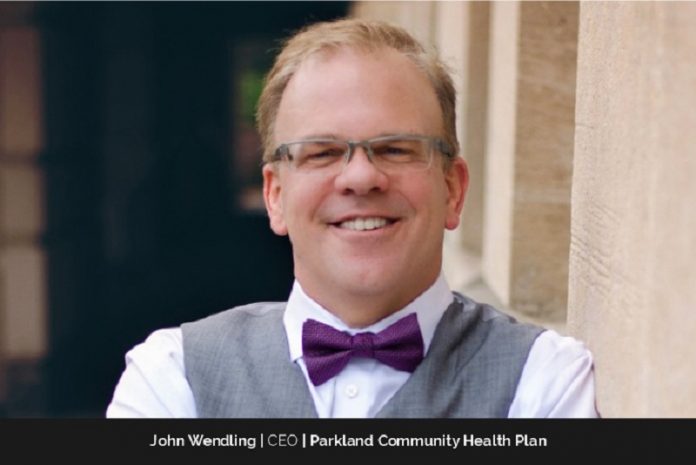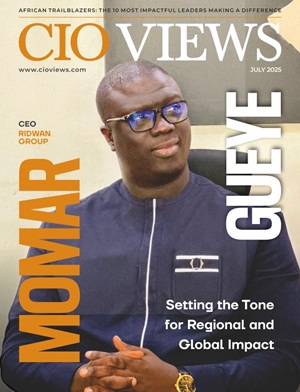
One cannot transform a struggling organization as a lone wolf. It requires the appropriate experiences and commitment of a strong team – this is the driving force behind the company’s success. “To be successful, it’s critical to have a strong team working together to push things forward,” says John Wendling, CEO of Parkland Community Health Plan (PCHP). The success the organization is experiencing today is largely due to the leadership team, which was formed shortly after he joined PCHP.
When John was appointed the CEO in 2019, the organization was experiencing significant losses in membership and revenue. Wholesale changes were required within PCHP to ensure that it not only survived but also flourished well into the future. A veteran of the healthcare industry, John quickly ascertained what steps he had to take to lead the organization out of the crisis. Building a strong team was his first priority.
Now, three years later, PCHP has experienced record growth and strong revenue. It has also grown in size from 15 full-time employees to 180. John has succeeded in transforming the organization, but as he believes, “when it comes to success, it’s important to be humble,” he does not take all the credit for it. He could execute his vision only because he was – and continues to be – surrounded by a strong executive leadership team.
Forming a Team
John joined PCHP with a vision for how to transform the organization. But like other exemplary leaders, he knew that he wouldn’t be able to realize that on his own. He needed support of a strong team to achieve his vision for the company. So, one of the first steps he took was to form an executive leadership team.
“When I was hiring my executive leadership team, I looked for certain qualities that would represent the pillars of our organization,” John says. “I wanted to be sure we had leaders who excelled at developing people and giving them the resources they needed to succeed.”
On his team, he wanted people who were skilled at implementing systems and procedures to ensure smooth operations; and subject-matter experts who could ensure that the technology used to manage member and provider experiences offered a seamless experience from start to finish.
John now works closely with the executive leadership team to set the strategic direction for their organization. He stresses that they are all links in a chain, having the same size and structure. Each link, however, represents different accountabilities within the organization; this is what will get them from where they currently are to where they want to be for their future state, explains John.
“Having trust and confidence in those around us is critical to achieve our shared goal. It’s not about me or any individual – it’s about all of us getting there together,” he adds. “We create the opportunity for failure when we believe we have to take on the world alone.” John personally met – and continues to meet – with all the new hires to stress the importance of this approach.
As the CEO of PCHP, John is accountable for developing and implementing a viable and sustainable business model for long-term operations. This includes providing overall leadership as it pertains to their healthcare delivery system, governance, and political environment as a managed care organization in Texas. John also manages PCHP’s relationships with the Board of Directors and other entities in the Parkland Health system.
“I’m excited to be part of a team that always keeps our members top of mind and works hard to ensure the increased quality of care, stronger provider relationships, reduced costs, and a first-class experience for the people we serve,” he says.
Parkland Community Health Plan
Parkland Health, one of the largest public health systems in the U.S, has a long history of providing trustworthy healthcare. It was founded in 1894, and more than a century later, it created Parkland Community Health Plan, or PCHP, to extend its mission.
PCHP, started in 1999, aims to give Dallas County residents access to a medical home that actively promotes healthy lifestyles and educates members on medical conditions in meaningful ways that actively promote health and wellness. “At PCHP, we strive to deliver the best care for our members and, in turn, create a more vibrant and healthy community,” John says. “We also view ourselves as necessary change agents for the greater community.”
PCHP has more than 6,000 physicians and over 40 hospitals in its network of providers, and, currently, it serves more than 230,000 children and adults across Dallas and several surrounding communities through Medicaid and CHIP programs. The organization covers almost everything, including doctor visits, immunizations, hospitalization, and home healthcare. “We’re a local plan, with local employees – we’re focused on the people who live in our area,” says John.
Under John’s leadership, PCHP continues to evolve and expand its reach in the community it serves. In April of 2021, he and his team completed an organizational transformation and moved away from third-party administration. They brought all operations in-house. Since that transition, PCHP introduced expanded offerings for its value-added services and partnered with new vendors for disease management and non-emergency medical transportation. It also rolled out new alternative payment models for the providers in its network and received interim accreditation by the National Committee for Quality Assurance (NCQA).
PCHP strives to achieve the Institute for Healthcare Improvement’s (IHI) Triple Aim (Population Health, Experience of Care, Per Capita Cost). It has also added a fourth aim – pursuing health equity. John points out that this framework describes the organization’s approach to optimizing overall healthcare performance.
Changes after Pandemic
The healthcare industry is always evolving. The COVID-19 pandemic, however, has sped up the adoption of technologies by industry players. PCHP tapped into virtual solutions to maintain high standards of care while promoting patient safety. It also partnered with one of its largest provider groups to offer telehealth access to its pediatric members; in addition to giving families a safer option for accessing care during the pandemic. John explains that the increased telehealth usage means they are able to offer alternative care options for many non-urgent cases away from local emergency rooms.
Recently, PCHP also introduced a mobile app for pregnant members. It provides them access to a digital health platform, where they can interact with a digital “friend” who provides insight into their mood while sharing health tips and companionship. When the technology identifies an urgent need, it triggers a call from a health professional to check in with the member and offer help.
During the pandemic, PCHP onboarded 92 percent of its workforce. A vast majority of them still work in a 100 percent remote environment. Fortunately, overall productivity has been solid during the last two years, with team members collaborating to build a strong, mission-focused foundation for the organization. “From a culture standpoint, our virtual all-staff meetings keep staff informed and engaged with their colleagues,” says John.
30+ Year Professional Journey
John is a veteran of the healthcare industry with more than 30 years of experience. Before joining PCHP, he served as CEO at Magellan Healthcare of Nebraska, CEO at HealthFirst of Ohio, Inc., and worked as Chief Operating Officer at AmeriGroup of Ohio, Inc. He also has held roles at Bon Secours Mercy Health, (formerly Catholic Healthcare Partners), Cincinnati Children’s Hospital Medical Center, and the United States Air Force (USAF) – Williams AFB, Phoenix, AZ.
The first 20 years of John’s career were on the provider side of the equation. He then gained momentum in mission-driven, nonprofit organizations where there was a significant focus on uninsured care and underserved populations. “I started to appreciate where quality adds value to any situation a person could find themselves in,” says John.
After his stint in nonprofit organizations, he moved to the hospital side with a focus on quality outcomes. In his current role, John strives to help his teams deliver quality service and care to both members and providers because he believes that is the best way to get better outcomes.
John earned his MBA from Northern Kentucky University/the University of Atlanta and a Bachelor of Science in Business Management from Northern Kentucky University.
Rejection Offers an Opportunity
John considers himself fortunate to have had many positive experiences throughout his career. It, however, does not mean that he has encountered no challenge or failure in his illustrious career. “There were several perceived ‘failures’ that got me to where I am today,” he says.
Early in his career, when John worked in cost containment at Cincinnati Children’s Hospital, he was asked to put together some reports regarding waste within various departments. He recalls that it was in the early days of computers, so getting access to department-level data wasn’t as easy as it is today. So, he had to use a ruler and a pen to create his graphs, then send them off to nursing administration or physician offices to have them fill in the details. At a certain point, the hospital decided to create a new role for the work he was doing to better show results. John applied for the position, but didn’t get it. It devastated him as it would have been his first leadership opportunity.
Later, upon reflection, he realized that rejection gave him an opportunity to move on to even bigger leadership roles. “I didn’t see it at the time, but my greatest learning was to accept what’s in front of you and have enough confidence and faith in yourself to not let something that is perceived as negative impact where you’re headed,” John says. “Throughout our lives, we have disappointments, professional and personal – and it’s important to learn from those disappointments and come through them stronger and more focused.”
Greatest Achievement – Legacy
“Legacy,” according to John, who has coached his kids’ competitive sports teams, is one of his greatest achievements. Legacy, for him, has nothing to do with the tournament one plays or the championship one wins. “While that may get you a trophy, trophies aren’t what is important, it is working together as a team to improve,” says John.
There are five young men whom John coached from a young age now coaching kids themselves. When they come back and say, “Coach John, there’s so much you taught me, so much you did, and that has inspired me to coach,” that’s a great feeling, he points out. “Trophies are nice but creating a legacy to shape the next generation – that’s what it’s all about.”
Currently, the legacy that he is creating involves the leaders who joined him in the journey with PCHP. Many moved from different parts of the country and were willing to uproot their lives to join an “incredible” cause. “This legacy will be sustainability and viability for the long term – well beyond what I do while I’m with this organization,” John says.
“Legacy is all about the next generation and what you do to mold and impact them, so they are equipped to pay it forward to help the generation after they succeed,” he adds. “The reward when you build a legacy is what matters.”
Unwinding after Work
When he is not focused on work, the “innovative” and “fun” CEO of PCHP likes to unwind. He has varied interests and passions. One of John’s big passions is music. “I’m a regular concertgoer and have a music room at home with several instruments and rock ‘n roll themed décor from across the decades,” he says. He also spends a lot of time working in the yard and enjoys landscaping, as he believes – like his day job – it is all about creating and executing a vision.
John loves to travel as well. “I have a dynamite individual in my life to share great experiences with across the U.S. and abroad. We always love meeting new people – as we like to say, ‘There are no strangers in our world, just friends we haven’t met yet’,” he says.
Family is very important for John, who is a father to three grown children and grandfather to three granddaughters. Even though they are currently about 900 miles apart, he stays in touch with his family and keeps himself up to date on his granddaughters’ school activities and sports achievements.
Future Plans
One key measurement of PCHP’s success is its ability to serve more of the community. In the next 5-10 years, the organization intends to serve as many Medicaid and CHIP-eligible members as possible. And, John is also looking forward to the future introduction of additional product lines, including the ACA Marketplace, commercial products, and additional Medicaid/Medicare populations.
Message to Aspiring Leaders
John believes in learning from missed opportunities – “whether your own or others’ missed opportunities that impacted you.” In his message to aspiring leaders, he points out that to be a good leader, it is vital to keep learning throughout one’s career.
“In particular, I think that future healthcare leaders need to be open to innovation and really look for ways to meet their customers where they are,” John adds. “Showing empathy is important in this line of work – the decisions we make are impacting people’s lives.”




















